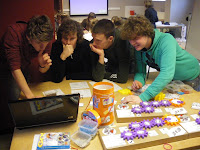For some time, my work, both at theUniversity of Wales, Newport, and at previous Universities has been developing initiatives, structures and mindsets towards promoting the model of an entrepreneurial university.
Where I have worked to implement this type of Higher Education provision, there has been a long, and successful, history of HE providers of high-quality professional programmes, such as here in Newport working closely with businesses and the community on promoting entrepreneurship. In South East Wales, we have remained committed to developing a vibrant City-Region with students having access to incubator centres. We see the Entrepreneurial University as a more strategic, holistic framework for this development which is complementary and supportive to our Mission rather than divergent.
We need to equip our students with different types of ‘life skills’, or most importantly, the ability to adapt to changing circumstances and acquire new skills and new learning.
The environment in which we live is subject to increasing change, and change that is accelerating. It is likely that our students, for example, will experience far more change in their lives than most of us (the staff) ever have, or ever will, over the course of our lifetimes. Many of our current students will change their jobs several times, and perhaps even as many as ten times, they will have to retrain many times over, travel and work abroad, go into self-employment and, on occasions, have to deal with unemployment. They will have to learn to use technologies that are currently beyond our imagination.
That is a responsibility – as well as a head-ache for educators. We need to equip our students with different types of ‘life skills’, or most importantly, the ability to adapt to changing circumstances and acquire new skills and new learning. In fact, we need to prepare our students for jobs that have not yet been invented. The best way, is to enable them to acquire personal entrepreneurial capacity to deal with the far greater levels of uncertainty, complexity and even periods of chaos in both their work and personal life.
As organisations entering a period of diminishing resources, we need to be entrepreneurial ourselves; more driven, more competitive and more commercial.
This wider perspective on entrepreneurship places emphasis on entrepreneurial learning in which the pedagogical and organisational processes are developed necessary to support entrepreneurial competency and attributes across a range of different disciplinary and multi-disciplinary subject contexts on degree and diploma programmes.
The idea of setting up programmes, and even organisations, to develop entrepreneurial capacity in students and graduates is not only espoused by the private sector, but applies to all organisations, and particularly to start-ups including social enterprises. Entrepreneurial skills and capabilities (the so-called ‘entrepreneurial mindset’) are equally important in the management and leadership of public bodies and social, or charitable, organisations, and this recognition is all the more vital at a time when public funding diminishes. There is an obvious potential link between the work of a university as developer of entrepreneurial mindsets and the university itself as ‘entrepreneurial organisation’.
 Indeed, the Entrepreneurial University is designed to play a significant role in the regeneration of its local region, enable and transfer innovation and provide entrepreneurial leadership in partnership with business and government bodies – the so-called Triple Helix. As organisations entering a period of diminishing resources, we need to be entrepreneurial ourselves; more driven, more competitive and more commercial.
Indeed, the Entrepreneurial University is designed to play a significant role in the regeneration of its local region, enable and transfer innovation and provide entrepreneurial leadership in partnership with business and government bodies – the so-called Triple Helix. As organisations entering a period of diminishing resources, we need to be entrepreneurial ourselves; more driven, more competitive and more commercial.
Behind our idea of an Entrepreneurial University at Newport sits a body of literature and educational thinking that has arisen in the UK and abroad. Much of the recent thinking in this respect is influenced by the work of Professor Allan Gibb, Paul Hannon and others who have developed the Entrepreneurial University Leadership Programme (EULP), initially based at Said Business School, Oxford, and now sponsored by Universities UK and the National Centre for Entrepreneurship in Education.
We also have the responsibility to equip our students with the skills to be the very best that they can be.
Highly relevant to this is the work of the US Kauffman Foundation and its Cross-Campus Entrepreneurial Education Initiative, the Innovative University models of Linkoping and Twente, in the European Consortium of Innovative Universities (ECIU) and, in the UK, the work of NESTA and Professor John Goddard in formulating the Connected University within a ‘learning region’. The ideas in these papers and resources may now be becoming of age as the Times Higher Education Supplement now runs an annual competition for UK entrepreneurial universities.
As students are increasingly demanding to be equipped with skills for portfolio careers, universities find themselves developing further the ideas of the Entrepreneurial University, which provides a model that will not only provide for individual enterprise and institutional growth in more uncertain times. We also have the responsibility to equip our students with the skills to be the very best that they can be.








